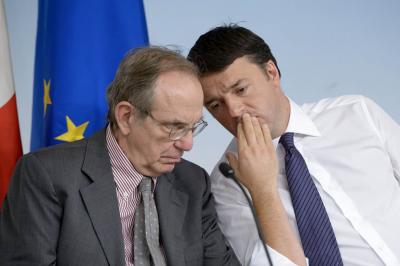Italy battles with 36 billion Greek exposure

ROME - Italian Economic Minister Pier Carlo Padoan has tweeted that Italy, through direct loans and Rome's participation in European safeguard mechanisms, is exposed to Greece to the tune of 35.9 billion euros.
Padoan said he wanted to clear up all previous misinterpretations by writing, "erroneous data about Italy's exposure to Greece has been circulated: taking into account bilateral loans and guarantees, the figure is 35.9 billion."
However, Italian Prime Minister Matteo Renzi immediately announced that Italy is "out of the firing line" in regards to the evential impact of Greece defaulting on its public debt. He told Il Sole 24 Ore that, "we have embarked on a courageous path of structural reforms, the economy is returning to growth and the ECB's umbrella shelters us."
He added that he was not worried for Italy but rather for the future of the European Union in general, whilst also blaming Europe's lack of a long-term approach to policies.
This announcement comes as the Milan stock exchange closed 5.17 percent down on Monday amidst the Greece debt crisis, with the spread rising to 159 points. However, Antonio Patuelli, president of the Associazione Bancaria italiana, has stated that the consequences for Italian banks are "very low."
Meanwhile, European leaders continue to warn against the Greek 'no' vote in the referendum to take place this weekend. The shock referendum call, announced by Greek Prime Minister Tsipras Saturday, marked a turning point in the governance of the European Union. The referendum, to take place on July 5, will ask the Greek electorate to decide whether they are in favour of accepting the EU proposals and conditions.
Renzi wrote in English on Twitter "the point is: greek referendum won't be a derby EU Comission vs Tsipras, but euro vs dracma. This is the choice".
German Chancellor Angela Merkel warns that, "if the euro fails, Europe fails." She continued by saying that, "Europe has to be ready to find a compromise for every challenge."
"You shouldn't commit suicide because you're afraid of dying," Jean-Claude Juncker, the president of the European Commission, said in a speech to convince Greeks to vote "yes". The president has previously remarked that he felt betrayed by the call for a referendum. He continued by saying that a 'no' vote, "will mean that Greece is saying 'no' to Europe."
French President François Hollande issued a similar warning. “It’s a question of knowing whether the Greeks want to remain in the eurozone—which is where they belong in my opinion—or if they will take the risk of exiting,” Mr. Hollande said, following an emergency meeting with top ministers and advisers.
Hollande also stressed that France, and the eurozone in general, are now more capable to withstand a Greek departure. “Today the French economy is robust—much more so than four years ago—and it has nothing to fear from what could happen,” the French leader said.
The maverick Italian Northern League Party and the opposition Five Star Movement both have added that they believe that whatever the outcome of the referendum, the move is advantageous as it challenges the status quo of European governance.
Greek banks will remain closed until July 7, two days after the referendum takes place.
Meanwhile, the Greek government has confirmed that Greece will default on the 1.55 billion euro International Monetary Fund (IMF) payment, which was due Tuesday.


